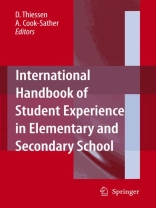The International Handbook of Student Experience in Elementary and Secondary School brings together in a single volume the groundbreaking work of scholars who have conducted studies of student experiences of school in Afghanistan, Australia, Canada, England, Ghana, Ireland, Pakistan, and the United States. Drawing extensively on students’ interpretations of their experiences in school as expressed in their own words, chapter authors offer insight into how students conceptualize and approach school, understand and address the ongoing social opportunities for and challenges in working with other students and teachers, and the multiple ways in which they shape and contribute to school improvement. The individual chapters are framed by an opening chapter, which provides background on, bases of, and trends in research on students’ experiences of school, and a final chapter, which uses the interpretive framework translation provided to explore how researching students’ experiences of school challenges those involved to translate their qualitative research methods, the terms they evoke to describe and define students’ experiences of schools, and, in fact, themselves as researchers.
Inhaltsverzeichnis
How Students Participate in and Make Sense of Life in Classrooms and Schools.- to Section One.- Naming Student Experiences and Experiencing Student Naming.- Teaching as Research: Puzzling Over Words with Fourth Graders.- School Literacy and the Development of a Child Culture: Written Remnants of the “Gusto of Life”.- Dissolving Learning Boundaries: The Doing, Re-Doing, and Undoing of School.- “Some Things are Fair, Some Things are Not Fair, and Some Things are Not, Not Fair”: Young Children’s Experiences of ‘Unfairness’ in School.- The Role of Personal Standards in Second Graders’ Moral and Academic Engagement.- Mentors for Students in Elementary School: the Promise and Possibilities.- “I’ve Decided to Change and it’s Just Really Hard to, Like, Show the Teachers that”.- Students’ Perspectives on Good Teaching: Implications for Adult Reform Behavior.- Who Students Are and How They Develop in Classrooms and Schools.- to Section Two.- “Boys Will Be Boys” but in what Ways? Social Class and the Development of Young Boys’ Schooling Identities.- Schooling, Normalisation, and Gendered Bodies: Adolescent Boys’ and Girls’ Experiences of Gender and Schooling.- Differences in Transition: Diverse Students Navigating the First Year of High School.- Building Theories of Their Lives: Youth Engaged In Drama Research.- How Students Learn About Right and Wrong in the First Year of a Pakistani Private School.- Schooling in the Context of Difference: The Challenge of Post-Colonial Education in Ghana.- Ali: Becoming A Student–A Life History.- Portraits of Self and Identity Constructions: Three Chinese Girls’ Trilingual Textual Powers.- Finding Their Way: Immigrant And Refugee Students In A Toronto High School.- How Students are Actively Involved in Shaping Their Own Learning Opportunities and in the Improvement of What Happens in Classrooms and Schools.- to Section Three.- Student Voice, Student Engagement, And School Reform.- Stressed-Out Students-SOS: Youth Perspectives on Changing School Climates.- Toward the Pedagogically Engaged School: Listening to Student Voice as a Positive Response to Disengagement and ‘Dropping Out’?.- “It’s Not About Systems, It’s About Relationships”: Building A Listening Culture In A Primary School.- Using Students’ Voices To Inform And Evaluate Secondary School Reform.- Building Student Voice for School Improvement.- Student Voice in School Reform: from Listening to Leadership.- Clarifying the Purpose of Engaging Students as Researchers.- Making It Real: Engaging Students in Active Citizenship Projects.- Youth Research/Participatory Methods for Reform.- Translating Researchers: Re-imagining the Work of Investigating Students’ Experiences in School.- Researching Student Experiences in Elementary and Secondary School: An Evolving Field of Study.- Researching Student Experiences in Elementary and Secondary School: An Evolving Field of Study.












